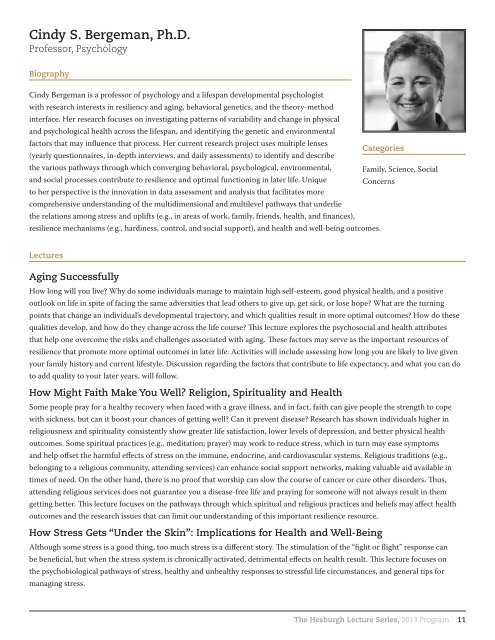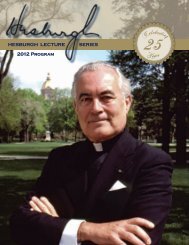HESBURGH LECTURE SERIES 2013 Program - Alumni Association ...
HESBURGH LECTURE SERIES 2013 Program - Alumni Association ...
HESBURGH LECTURE SERIES 2013 Program - Alumni Association ...
You also want an ePaper? Increase the reach of your titles
YUMPU automatically turns print PDFs into web optimized ePapers that Google loves.
Cindy S. Bergeman, Ph.D.<br />
Professor, Psychology<br />
Biography<br />
Cindy Bergeman is a professor of psychology and a lifespan developmental psychologist<br />
with research interests in resiliency and aging, behavioral genetics, and the theory-method<br />
interface. Her research focuses on investigating patterns of variability and change in physical<br />
and psychological health across the lifespan, and identifying the genetic and environmental<br />
factors that may influence that process. Her current research project uses multiple lenses<br />
Categories<br />
(yearly questionnaires, in-depth interviews, and daily assessments) to identify and describe<br />
the various pathways through which converging behavioral, psychological, environmental, Family, Science, Social<br />
and social processes contribute to resilience and optimal functioning in later life. Unique Concerns<br />
to her perspective is the innovation in data assessment and analysis that facilitates more<br />
comprehensive understanding of the multidimensional and multilevel pathways that underlie<br />
the relations among stress and uplifts (e.g., in areas of work, family, friends, health, and finances),<br />
resilience mechanisms (e.g., hardiness, control, and social support), and health and well-being outcomes.<br />
Lectures<br />
Aging Successfully<br />
How long will you live? Why do some individuals manage to maintain high self-esteem, good physical health, and a positive<br />
outlook on life in spite of facing the same adversities that lead others to give up, get sick, or lose hope? What are the turning<br />
points that change an individual’s developmental trajectory, and which qualities result in more optimal outcomes? How do these<br />
qualities develop, and how do they change across the life course? This lecture explores the psychosocial and health attributes<br />
that help one overcome the risks and challenges associated with aging. These factors may serve as the important resources of<br />
resilience that promote more optimal outcomes in later life. Activities will include assessing how long you are likely to live given<br />
your family history and current lifestyle. Discussion regarding the factors that contribute to life expectancy, and what you can do<br />
to add quality to your later years, will follow.<br />
How Might Faith Make You Well? Religion, Spirituality and Health<br />
Some people pray for a healthy recovery when faced with a grave illness, and in fact, faith can give people the strength to cope<br />
with sickness, but can it boost your chances of getting well? Can it prevent disease? Research has shown individuals higher in<br />
religiousness and spirituality consistently show greater life satisfaction, lower levels of depression, and better physical health<br />
outcomes. Some spiritual practices (e.g., meditation; prayer) may work to reduce stress, which in turn may ease symptoms<br />
and help offset the harmful effects of stress on the immune, endocrine, and cardiovascular systems. Religious traditions (e.g.,<br />
belonging to a religious community, attending services) can enhance social support networks, making valuable aid available in<br />
times of need. On the other hand, there is no proof that worship can slow the course of cancer or cure other disorders. Thus,<br />
attending religious services does not guarantee you a disease-free life and praying for someone will not always result in them<br />
getting better. This lecture focuses on the pathways through which spiritual and religious practices and beliefs may affect health<br />
outcomes and the research issues that can limit our understanding of this important resilience resource.<br />
How Stress Gets “Under the Skin”: Implications for Health and Well-Being<br />
Although some stress is a good thing, too much stress is a different story. The stimulation of the “fight or flight” response can<br />
be beneficial, but when the stress system is chronically activated, detrimental effects on health result. This lecture focuses on<br />
the psychobiological pathways of stress, healthy and unhealthy responses to stressful life circumstances, and general tips for<br />
managing stress.<br />
The Hesburgh Lecture Series, <strong>2013</strong> <strong>Program</strong> 11



